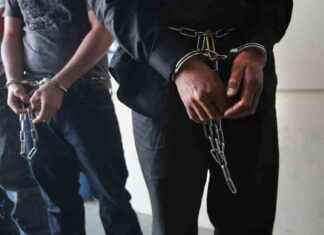A frank refusal from Volodymyr Zelensky, a polite but non-committal attention from Vladimir Putin. In 48 hours of travel, by train and plane, between Kiev and Saint-Petersburg, the four African heads of state who took part in the attempt at mediation between Russia and Ukraine were able to measure the difficulty of submitting a peace plan to two belligerents who, in their public declarations and in their actions, do not seem ready to give up anything.
“The war cannot last forever […] We want this war to end,” came to plead in Saint Petersburg on Saturday, June 17, before Mr. Putin, South African President Cyril Ramaphosa, accompanied by his peers Senegalese, Comorian and Zambian, after the Heads of State of Congo-Brazzaville, Egypt and Uganda decided in extremis to be represented.
The African delegation, carrying a ten-point peace plan including “de-escalation on both sides”, “recognition of the sovereignty” of countries as recognized by the UN, “security guarantees” for all parties, the lifting of restrictions on the export of grain via the Black Sea or the “release of prisoners of war”, did not obtain a direct dismissal from Russia. After the meeting, Kremlin spokesman Dmitry Peskov said that “President Putin has expressed interest” in a proposal which he says remains “very difficult to implement”.
A “Balanced Approach”
Welcoming “a balanced approach of our African friends towards the Ukrainian crisis”, Mr. Putin above all endeavored, in front of his guests, to demonstrate that the refusal to dialogue came from kyiv. “It was not us, but the Ukrainian authorities, who said they would not conduct any negotiations,” he told his South African counterpart. I understand your concern, I share it and we are ready to study all proposals. But the Ukrainian side does not want this. »
In support of his remarks, the Russian president exhibited a document presented as dating from March 2022 and which, according to him, was “initialled” by Ukrainian representatives. At the time, the two countries were having peace talks in Istanbul and, according to Mr. Putin, Kiev would have agreed to most of the Russian demands before sending this agreement “to the dustbin of history” after the withdrawal of the Russians. Russian troops from the Kiev and Chernihiv regions, a maneuver presented as a “gesture of goodwill” but which mainly followed a series of military setbacks and revealed the atrocities committed in several localities in northern Ukraine.
On Friday, in kyiv, Volodymyr Zelensky for his part opposed a clearer refusal to the request for “de-escalation” formulated by Mr. Ramaphosa. “Today I made it clear during our meeting that allowing any negotiations with Russia now, when the occupier is on our land, means freezing the war, freezing the pain and suffering. Russia will take advantage of this to become more powerful, to arm itself even more and to attack Ukraine even more. »
Between Pretoria and kyiv, trust remains to be built. After the visit of African presidents to Boutcha on Friday, Mr. Ramaphosa refused to condemn the crimes committed in this city by Russian troops. “We saw what happened there. I was told there was an ongoing investigation. I think that this procedure must continue,” limited himself to declaring the South African head of state, whose country has always refused to condemn the invasion of Ukraine before the United Nations and whose party , the ruined African National Congress (ANC) received a donation of 826,000 dollars (755,000 euros) in March from a Russian oligarch.
Moments earlier, members of his delegation had suggested that the missiles that fell on kyiv as the procession of heads of state passed may not have been fired by Russia.
Diplomatic offensive
While the head of French diplomacy is expected Monday and Tuesday in South Africa, the United States has recently expressed concern about a rapprochement between Pretoria and Moscow. The American ambassador on the spot, Reuben Brigety, thus accused in May the South African government of having delivered weapons to Russia in December.
However, if Moscow has been leading a diplomatic offensive on the African continent in recent years in order to renew the friendships lost with the end of the Soviet Union, the Kremlin has not made any concrete gesture here allowing African heads of state to be able to put forward a first achievement, even on the issue of blocking grain exports, which directly affect the continent.
“It would be a false impression to consider this mission a failure,” said a member of the delegation. There are public statements, but in private, the words are more open. It is notable that Putin recognizes the sovereignty of states according to the UN charter and he has accepted some of the wishes expressed by Zelensky,” the source continues, without specifying which ones. “This is just the beginning of a process going through Africa,” she said, as the seven heads of state who should have been on the trip are expected to meet by videoconference for a first assessment during the first July week.
For Vladimir Putin, time is running out if he wants to make a significant gesture towards the continent, while the Russia-Africa summit is scheduled in Saint-Petersburg from July 26 to 29. A meeting that he intends to use as a demonstration of the extension of his relations with Africa, “a priority of Russian foreign policy”, he still recalled despite his invasion of Ukraine.






